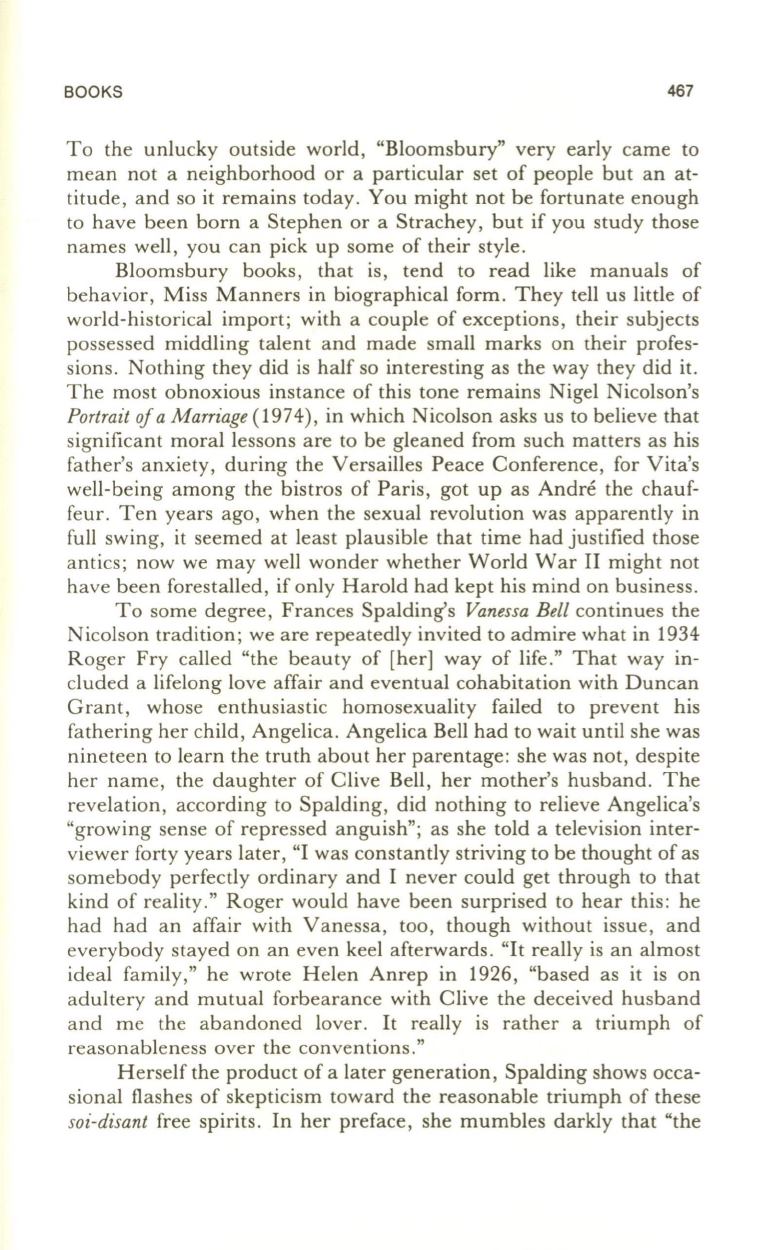
BOOKS
467
To the unlucky outside world, "Bloomsbury" very early carne to
mean not a neighborhood or a particular set of people but an at–
titude, and so it remains today. You might not be fortunate enough
to have been born a Stephen or a Strachey, but if you study those
names well, you can pick up some of their style .
Bloomsbury books, that is, tend to read like manuals of
behavior, Miss Manners in biographical form. They tell us little of
world-historical import; with a couple of exceptions, their subjects
possessed middling talent and made small marks on their profes–
sions . Nothing they did is half so interesting as the way they did it.
The most obnoxious instance of this tone remains Nigel Nicolson's
Portrait
of
a Marriage
(1974), in which Nicolson asks us to believe that
significant moral lessons are to be gleaned from such matters as his
father's anxiety, during the Versailles Peace Conference, for Vita's
well-being among the bistros of Paris, got up as Andre the chauf–
feur. Ten years ago , when the sexual revolution was apparently in
full swing, it seemed at least plausible that time had justified those
antics; now we may well wonder whether World War II might not
have been forestalled, if only Harold had kept his mind on business.
To some degree, Frances Spalding's
Vanessa Bell
continues the
Nicolson tradition; we are repeatedly invited to admire what in 1934
Roger Fry called "the beauty of [her] way of life." That way in–
cluded a lifelong love affair and eventual cohabitation with Duncan
Grant, whose enthusiastic homosexuality failed to prevent his
fa thering her child, Angelica . Angelica Bell had to wait until she was
nineteen to learn the truth about her parentage: she was not, despite
her name, the daughter of Clive Bell, her mother's husband. The
revelation, according to Spalding, did nothing to relieve Angelica's
"growing sense of repressed anguish"; as she told a television inter–
viewer forty years later, "I was constantly striving to be thought of as
somebody perfectly ordinary and I never could get through to that
kind of reality." Roger would have been surprised to hear this: he
had had an affair with Vanessa, too, though without issue, and
everybody stayed on an even keel afterwards.
"It
really is an almost
ideal family," he wrote Helen Anrep in 1926, "based as it is on
adultery and mutual forbearance with Clive the deceived husband
and me the abandoned lover.
It
really is rather a triumph of
reasonableness over the conventions."
Herself the product of a later generation, Spalding shows occa–
sional flashes of skepticism toward the reasonable triumph of these
soi-disant
free spirits . In her preface, she mumbles darkly that "the


